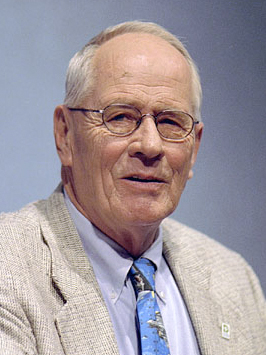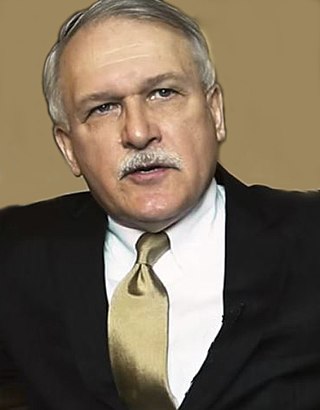
Calvin Coolidge was the 30th president of the United States from 1923 to 1929. Born in Vermont, Coolidge was a Republican lawyer from New England who climbed up the ladder of Massachusetts state politics, becoming the state's 48th governor; his response to the Boston Police Strike of 1919 thrust him into the national spotlight as a man of decisive action. Coolidge was elected the country's 29th vice president the next year, succeeding the presidency upon the sudden death of President Warren G. Harding in 1923. Elected in his own right in 1924, Coolidge gained a reputation as a small-government conservative distinguished by a taciturn personality and dry sense of humor, receiving the nickname "Silent Cal". Though his widespread popularity enabled him to run for a third term, he chose not to run again in 1928, remarking that ten years as president was "longer than any other man has had it – too long!"

Stephen Edward Ambrose was an American historian, most noted for his biographies of U.S. Presidents Dwight D. Eisenhower and Richard Nixon. He was a longtime professor of history at the University of New Orleans and the author of many bestselling volumes of American popular history.
The silent majority is an unspecified large group of people in a country or group who do not express their opinions publicly. The term was popularized by U.S. President Richard Nixon in a televised address on November 3, 1969, in which he said, "And so tonight—to you, the great silent majority of my fellow Americans—I ask for your support." In this usage it referred to those Americans who did not join in the large demonstrations against the Vietnam War at the time, who did not join in the counterculture, and who did not participate in public discourse. Nixon, along with many others, saw this group of Middle Americans as being overshadowed in the media by the more vocal minority.

A doodle is a drawing made while a person's attention is otherwise occupied. Doodles are simple drawings that can have concrete representational meaning or may just be composed of random and abstract lines or shapes, generally without ever lifting the drawing device from the paper, in which case it is usually called a scribble.

Lawrence Rush "Rick" Atkinson IV is an American author, most recently of The British Are Coming: The War for America, Lexington to Princeton, 1775–1777, the first volume in the Revolution Trilogy. He has won Pulitzer Prizes in history and journalism.
Alan Brinkley was an American political historian who taught for over 20 years at Columbia University. He was the Allan Nevins Professor of History until his death. From 2003 to 2009, he was University Provost.
The Independent Institute is an American libertarian think tank based in Oakland, California. Founded in 1986 by David J. Theroux, the institute focuses on political, social, economic, legal, environmental, and foreign policy issues. It has more than 140 research fellows. The institute was originally established in San Francisco, was re-located in 1989 to Oakland, and since 2006 has had an office in Washington, D.C. The institute is organized into seven centers addressing a range of issues. According to the 2020 Global Go To Think Tank Index Report, the institute is ranked number 42 in the "Top Think Tanks in the United States".
These are the references for further information regarding the history of the Republican Party in the U.S. since 1854.

Douglas Brinkley is an American author, Katherine Tsanoff Brown Chair in Humanities, and professor of history at Rice University. Brinkley is the history commentator for CNN, Presidential Historian for the New York Historical Society, and a contributing editor to the magazine Vanity Fair. He is a public spokesperson on conservation issues. He joined the faculty of Rice University as a professor of history in 2007.

David Levering Lewis is an American historian, a Julius Silver University Professor, and a professor of history at New York University. He is twice winner of the Pulitzer Prize for Biography or Autobiography, for part one and part two of his biography of W. E. B. Du Bois. He is the first author to win Pulitzer Prizes for biography for two successive volumes on the same subject.

David Pietrusza is an American author and historian.

Cabinet Magazine is a quarterly, Brooklyn, New York-based, non-profit art and culture magazine established in 2000. Cabinet Magazine also operates an event and exhibition space in Brooklyn. In 2022, Cabinet transitioned its magazine to be a digital publication, although it still publishes print books.

Amity Ruth Shlaes is a conservative American author, writer, and columnist. She writes about politics and economics from a classically liberal perspective. Shlaes has authored five books, including three New York Times Bestsellers. She currently chairs the board of trustees of the Calvin Coolidge Presidential Foundation and serves as a Presidential Scholar at The King's College in New York City. She is a recipient of the Bastiat Prize and, more recently, the Bradley Prize.
Robert Hugh Ferrell was an American historian and a prolific author or editor of more than 60 books on a wide range of topics, including the U.S. presidency, World War I, and U.S. foreign policy and diplomacy. One of the country's leading historians, Ferrell was widely considered the preeminent authority on the administration of Harry S. Truman, and also wrote books about half a dozen other 20th-century presidents. He was thought by many in the field to be the "dean of American diplomatic historians", a title he disavowed.
Roger Paul Morris is an American historian, foreign policy analyst, and journalist. He served on the staff of the U.S. National Security Council under the presidencies of both Lyndon Johnson and Richard Nixon. As an author he has won fellowships from the Guggenheim Foundation, the Society of American Historians and the National Endowment for the Humanities. On two occasions he has won the Investigative Reporters and Editors’ National Award for Distinguished Investigative Journalism.

The first inauguration of Calvin Coolidge as the 30th president of the United States was held on Friday, August 3, 1923, at the Coolidge Homestead in Plymouth Notch, Vermont, following the death of President Warren G. Harding the previous evening. The inauguration – the sixth non-scheduled, extraordinary inauguration to ever take place – marked the commencement of the first term of Calvin Coolidge as president. The presidential oath of office was administered to the new president by his father, John Calvin Coolidge Sr., who was a Vermont notary public and justice of the peace. On Tuesday, August 21, 1923, President Coolidge repeated the oath before Justice Adolph A. Hoehling Jr. of the Court of the District of Columbia at the Willard Hotel, Washington, D.C.

"I do not choose to run" was a statement made by U.S. president Calvin Coolidge to the press on August 2, 1927, on his decision not to run for the 1928 presidential election. The statement was ambiguous, and led to considerable debate as to the intentions of its language.
Joel Graham Brinkley was an American syndicated columnist. He taught in the journalism program at Stanford University from 2006 until 2013, after a 23-year career with The New York Times. He won the Pulitzer Prize for International Reporting in 1980 and was twice a finalist for a Pulitzer Prize for Investigative Reporting.

Calvin Coolidge's tenure as the 30th president of the United States began on August 2, 1923, when Coolidge became president upon Warren G. Harding's death, and ended on March 4, 1929. A Republican from Massachusetts, Coolidge had been vice president for 2 years, 151 days when he succeeded to the presidency upon the sudden death of Harding. Elected to a full four–year term in 1924, Coolidge gained a reputation as a small-government conservative. Coolidge was succeeded by former Secretary of Commerce Herbert Hoover after the 1928 presidential election.
Robert Francis Byrnes was an American professor of history, specializing in Russian history and Kremlinology.












